Select Language
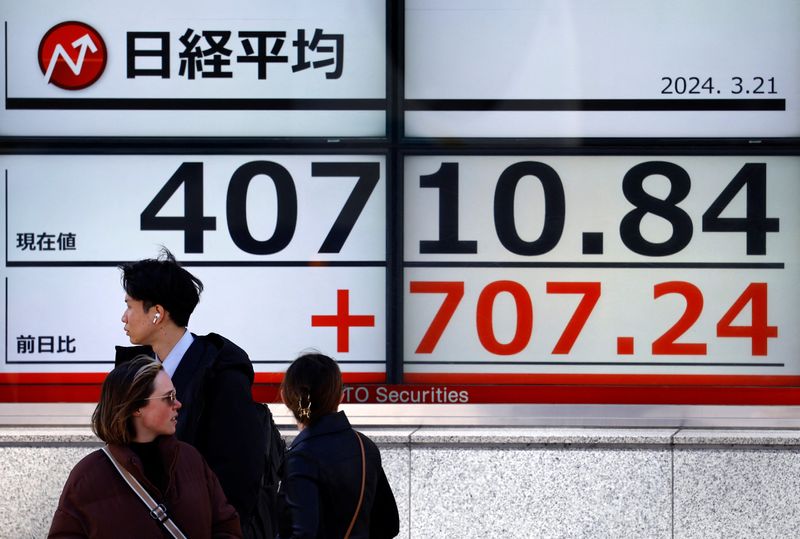
By Hernan Nessi
BUENOS AIRES (Reuters) - Argentina's economic activity index is expected to have shrunk 6.9% year-on-year in March, its deepest drop since 2020 and the fifth monthly contraction in a row, a Reuters poll on Tuesday showed.
The index slipped an estimated 7.2% in March from February, said the 13 local analysts in the survey.
The year-on-year contraction estimates ranged from 4% to 10.3%.
"The decline in sectors linked to domestic consumption, industry and construction is consolidating and deepening," said Pablo Besmedrisnik, economist and director of the consulting firm Invenomica, while noting mining and agriculture are among the sectors showing growth.
By Wayne Cole
SYDNEY (Reuters) - Asian shares edged higher on Wednesday as anxious investors dared to hope AI-diva Nvidia (NASDAQ:NVDA) could meet sky-high expectations, while keeping a wary eye on the outlook for U.S. and UK interest rates.
New Zealand's central bank offered a sobering assessment of its inflation problems, warning that rates would have to be higher for longer to bring them to heel in a shock to local markets.
That saw the kiwi dollar jump 0.9% to a one-month high of $0.6151 as bond yields spiked.
MSCI's broadest index of Asia-Pacific shares outside Japan firmed 0.4%, having already climbed for four straight weeks to reach a two-year top.
Japan's Nikkei eased 0.6% as data showed a weak yen was boosting exports but also stoking imported inflation and weighing on business sentiment.
EUROSTOXX 50 futures and FTSE futures both inched up 0.2%. S&P 500 futures and Nasdaq futures were both a fraction firmer.
Markets are braced for fireworks when Nvidia reports after the bell, with options priced for a swing of 8.7% in either direction, worth $200 billion in market value.
Analysts wonder how much more it can deliver given that the chip-maker already boasts a profit margin of 77%, and its stock is up 93% on the year so far.
"Sentiment is quite positive, with our bars well-above consensus and a sense that management has left some in the tank to surprise positively," said JPMorgan analyst Josh Meyers.
"This suggests that it may take a big upside surprise, on earnings or clearer forward guidance, to get the stock moving any higher."
CENTRAL BANK WATCH
Minutes of the U.S. Federal Reserve's last meeting due later in the day should confirm the next move is still likely down, but policy makers first need more confidence that inflation has resumed its downtrend.
Fed fund futures imply about a 66% chance of a rate cut by September and have 43 basis points of easing priced in for this year.
Figures on UK inflation due later in the session could decide whether the Bank of England eases as early as June, or waits to August.
Forecasts are for core consumer price inflation to slow to 3.6% in April, from 4.2% in March, and anything lower would narrow the odds on a June cut and likely pressure sterling.
The pound was holding just short of two-month highs at $1.2712, while the euro was trading steady at $1.0857, just off its recent top of $1.0895.
The dollar flatlined on the yen at 156.20 as the threat of Japanese intervention stalled its advance.
Gold held firm at $2,424 an ounce, after touching a record high of $2,449.89 early in the week. [GOL/]
Oil prices slipped amid concerns over the peak U.S. driving season, given that demand was seasonally tracking at its lowest since 2020 and retail prices had fallen for four weeks in a row. [O/R]
Brent crude fell 50 cents to $82.38 a barrel, and the spread over futures narrowed further, while U.S. crude lost 54 cents to $78.12 per barrel.
The South American country's industrial production indicator showed a 21.2% slowdown year-on-year in March, government data showed.
Economists remain cautious about the end of the first half-year and beginning of the second half, predicting a gradual recovery.
"We don't see a dizzying recovery in activity for the first half of the year," said Federico Gonzalez Rouco, economist at Empiria Consultores. "We believe that inflation is in a process of deceleration but it is also accumulating risks associated with the foreign exchange market."
Statistics agency INDEC is expected to publish the official figures on Wednesday.
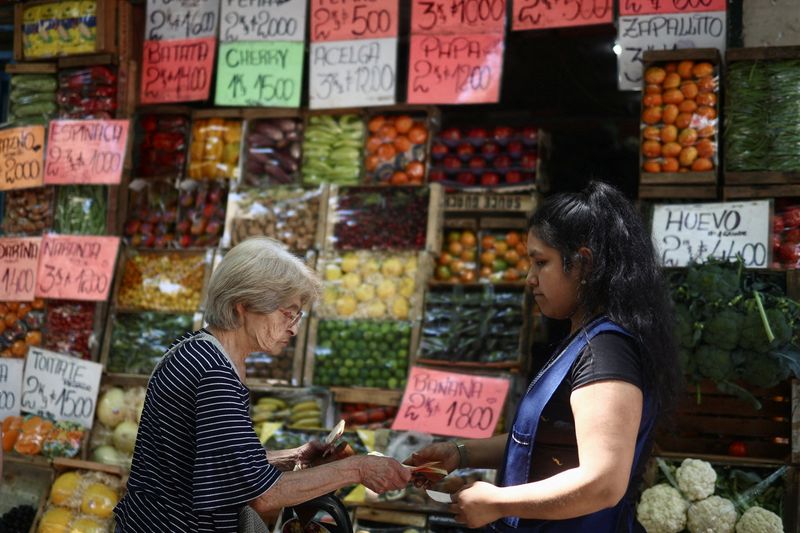
By Hernan Nessi
BUENOS AIRES (Reuters) - Argentina's economic activity index is expected to have shrunk 6.9% year-on-year in March, its deepest drop since 2020 and the fifth monthly contraction in a row, a Reuters poll on Tuesday showed.
The index slipped an estimated 7.2% in March from February, said the 13 local analysts in the survey.
The year-on-year contraction estimates ranged from 4% to 10.3%.
"The decline in sectors linked to domestic consumption, industry and construction is consolidating and deepening," said Pablo Besmedrisnik, economist and director of the consulting firm Invenomica, while noting mining and agriculture are among the sectors showing growth.
The South American country's industrial production indicator showed a 21.2% slowdown year-on-year in March, government data showed.
Economists remain cautious about the end of the first half-year and beginning of the second half, predicting a gradual recovery.
"We don't see a dizzying recovery in activity for the first half of the year," said Federico Gonzalez Rouco, economist at Empiria Consultores. "We believe that inflation is in a process of deceleration but it is also accumulating risks associated with the foreign exchange market."
Statistics agency INDEC is expected to publish the official figures on Wednesday.
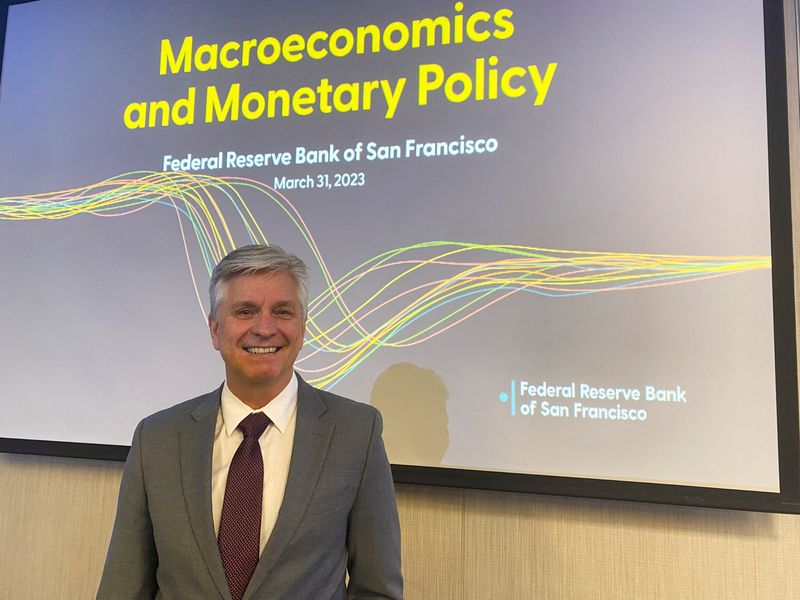
By Pete Schroeder and Howard Schneider
WASHINGTON/AMELIA ISLAND, Florida (Reuters) -Federal Reserve policymakers said on Tuesday the U.S. central bank should wait several more months to ensure that inflation really is back on track to its 2% target before cutting interest rates.
"In the absence of a significant weakening in the labor market, I need to see several more months of good inflation data before I would be comfortable supporting an easing in the stance of monetary policy," Fed Governor Christopher Waller told the Peterson Institute for International Economics in Washington.
The timeline was echoed by Cleveland Fed President Loretta Mester in comments on Tuesday night at an Atlanta Fed conference.
"I need to see a few more months of inflation data that looks like it is coming down," said Mester, who will attend her last Fed meeting in June before retiring.
"We're in a period when patience really matters," Boston Fed President Susan Collins said at the same event. "I think the data has been very mixed ... and it's going to take longer than I had previously thought."
The policymakers spoke as the Fed has downplayed talk of any further rate hikes, but also noted they feel the economy needs to cool further.
"We just don't want to go off a cliff. That's the critical thing," Waller said. "We are not seeing anything right now that looks like staying here for three or four months is going to cause the economy to go off a cliff." The comments were echoed by his colleagues who cited the low perceived risk of keeping rates elevated for now.
The Fed has kept its benchmark policy rate at 5.25%-5.50% since last July and, stung by three months of stronger-than-expected inflation readings from January to March, is only cautiously welcoming more recent encouraging signs of a loosening in the labor market and return to further progress in lowering inflation toward its 2% target.
"We read this as confirming Waller is open to cutting in September if, but only if, a more definitive downshift in inflation unfolds over the coming months," Evercore ISI Vice Chairman Krishna Guha said.
The remarks also appeared to add to market confidence in Fed rate cuts, with traders firming up expectations for a first reduction in borrowing costs in September and a second one at the Fed's final policy meeting of the year in December.
'RATHER WAIT LONGER'
In a separate appearance, Atlanta Fed President Raphael Bostic struck a similar tone to Waller, noting the central bank needs to be cautious about approving its first rate cut to be sure it does not touch off pent-up spending among businesses and households, and put policymakers in a position where inflation reaccelerates.
"It is in our interest to not start bouncing around. ... For me, I'd rather wait longer to make sure that doesn't happen," Bostic told reporters on the sidelines of the Atlanta Fed conference in Florida. He said he still expects inflation to edge lower through the year with a single rate cut being appropriate in the fourth quarter.
"I'm not in a hurry to cut rates," Bostic said. "We need to make sure that when we start on that path, it's unambiguous that inflation is going to get to 2%. ... The existence of this potential exuberance means that we have to be very cautious about when we do that first move, and it may mean that it has to happen later."
At a separate event at the Dallas Fed, Fed Vice Chair of Supervision Michael Barr added his voice to the chorus, repeating that higher inflation readings in the first quarter had not added to his confidence that prices pressures are easing.
"For me at least, that means we need to sit tight where we are for longer than we had previously thought," he said. "We need to see more evidence of continued progress on inflation for us to be in a position where we could think about adjusting the policy rate."
The policymakers spoke a day before the release of the minutes of the U.S. central bank's April 30-May 1 meeting, a key readout of a gathering that ended with officials feeling - in the words of Fed Chair Jerome Powell - that it "will take longer than previously expected" for them to have sufficient confidence in falling inflation to cut rates.
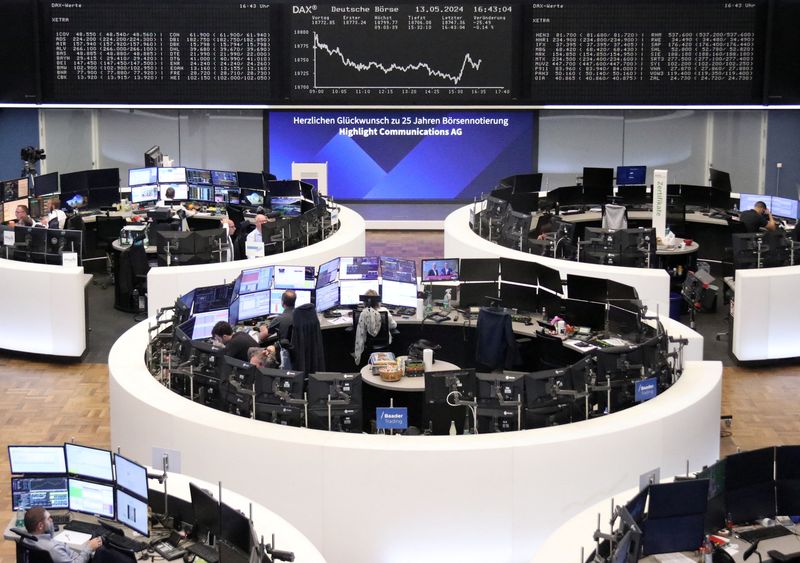
(Reuters) - European stocks inched lower on Tuesday, following losses in Asian equities as U.S. Federal Reserve officials tempered investor enthusiasm about potential interest rate cuts as they called for policy caution.
The pan-European STOXX 600 index slipped 0.3% by 0710 GMT, with gains in healthcare stocks more than offset by losses in banks and utilities.
Investors will focus on minutes from the Fed's last policy meeting and chip giant Nvidia (NASDAQ:NVDA)'s earnings on Wednesday to see if the recent momentum, that pushed U.S. and European equities to record highs, continues.
Weighing on market mood, Fed officials including Vice Chair Philip Jefferson were not ready to say inflation is heading to the central bank's 2% target, with several on Monday calling for continued policy caution.
The market declines came even as data showed German producer prices fell more than expected in April.
AstraZeneca (NASDAQ:AZN) gained 0.9%, after the drugmaker said it aims to grow revenue by about 75% to $80 billion by 2030.
Generali (BIT:GASI) dipped 3.3%, after Italy's top insurer reported first-quarter results, while energy contractor Saipem climbed 3.5% on winning new contracts worth $3.7 billion.
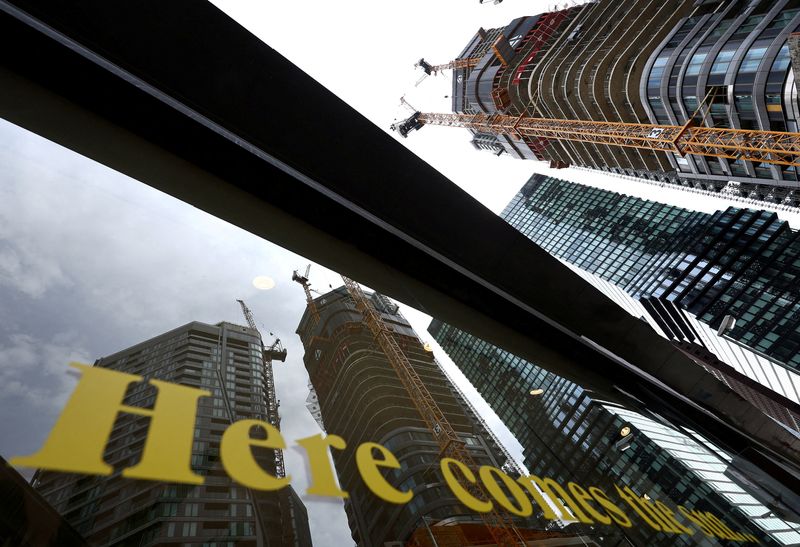
By Tom Sims and John O'Donnell
FRANKFURT (Reuters) - International investors are skirting German property deals as they dial back on a market in its worst crisis in a generation, potentially deepening the scars on Europe's biggest economy.
Foreign buyers accounted for 35% of purchases of commercial real estate in the first quarter, data from BNP Paribas (OTC:BNPQY) Real Estate shows. That is less than in any year since 2013 and comes against the backdrop of a 70% plunge in sales volumes from levels before the 2020-2021 pandemic.
The grim figures coincide with a debate about whether Germany is once again "the sick man of Europe" - a label it was given in late 1990s as it struggled with economic stagnation and high unemployment. The nation worked years to shake that label off, but it has re-emerged as Germany weans itself off Russian energy, gets tangled in bureaucracy and sees far-right politicians gaining in the polls.
Kurt Zech, one of Germany's biggest developers, warns the market will keep struggling until foreign investors return.
"The Americans have to come back. When the Blackstones, the Blackrocks, the Morgan Stanley's of this world and Carlyle and Apollo buy in the German market, that will be noticed and then we will all know that we have now reached the bottom," Zech told Reuters in an interview, speaking from his headquarters in the northern city of Bremen.
For years, low interest rates, cheap energy and a strong economy sustained a boom across the German property sector, which broadly contributes 730 billion euro ($793.51 billion) a year to the nation's economy, or roughly a fifth of Germany's output.
That boom ended when rampant inflation forced the European Central Bank to swiftly raise borrowing costs. Real-estate financing dried up, deals fizzled, projects stalled, major developers went bust, and some banks teetered. The industry called on Berlin to intervene.
Commercial property prices tumbled another 9.6% in the first three months of 2024 compared with a year earlier after a 10.2% drop for 2023 - according to the VDP banking association, predicting more pain ahead.
"Germany was a beacon of stability in Europe and people flocked to buy property here," said Carsten Brzeski, chief economist of Dutch bank ING in Germany, one of the country's biggest mortgage lenders.
"Now, the economic engine is stuttering and needs maintenance. It's no longer the shiny new thing investors want."
Foreign investors accounted for 37% of transaction volumes in German commercial property in 2023, the lowest reading of the past decade, according BNP Paribas. It slipped further to 35% in the first quarter.
There were years when foreigners accounted for half of all the deals for commercial property, which makes up the bulk of Germany's property market and eclipses residential sales.
While high interest rates have weighed on property markets globally, the takeaway from the annual gathering of the sector's global elite in Cannes, France, in March was that Germany was hit especially hard.
"Where the mood is really at its worst is Germany," Simone Pozzato, a managing director and fund manager at Hines, said in an interview there.
Another executive at a European developer, who declined to be named, said it planned to redeploy staff from Germany to markets such as Britain where investor interest was stronger and where activity was expected to recover sooner.
High energy costs, weak global demand, a disruptive shift towards net-zero economies, and growing competition from China are raising questions about Germany's economic model. Some executives say the nation's historically strong industrial base is close to cracking.
The German Council of Economic Experts last week cut its forecasts, predicting the economy will barely grow this year, while Chancellor Olaf Scholz spoke of "unprecedented challenges".
Some features of the German property market also make it a harder sell.
Germany rebuilt itself from the rubble of World War Two with a decentralized design without a single dominating city. That can be a turn-off for foreign buyers who tend to target truly global centres, such as London or Paris.
"It's ... easier to understand how those cities tick. It's easier than understanding Cologne," said Inga Schwarz, head of research at BNP Paribas Real Estate.
Another hurdle: German landlords typically try to ride out downturns without slashing property prices, deterring potential buyers and delaying a pickup in transactions needed to revive the market.
"International market participants criticize that in Germany large property holders have only devalued by a few percentage points in some cases, while other countries devalued 20% to 30%," said Hela Hinrichs, senior research analyst with Jones Lang LaSalle.
Those few deals around are often being made under duress. Signa, the property conglomerate that went bust, has been shedding assets to pay off creditors, and the landlord Vonovia has been selling apartments to pare down debt.
"If you look deeper into many of the deals, you'll see that they have their peculiarities," said Marcus Cieleback, head of research at the German property asset manager Patrizia. "Is this really a free market transaction or is it possibly something else?"
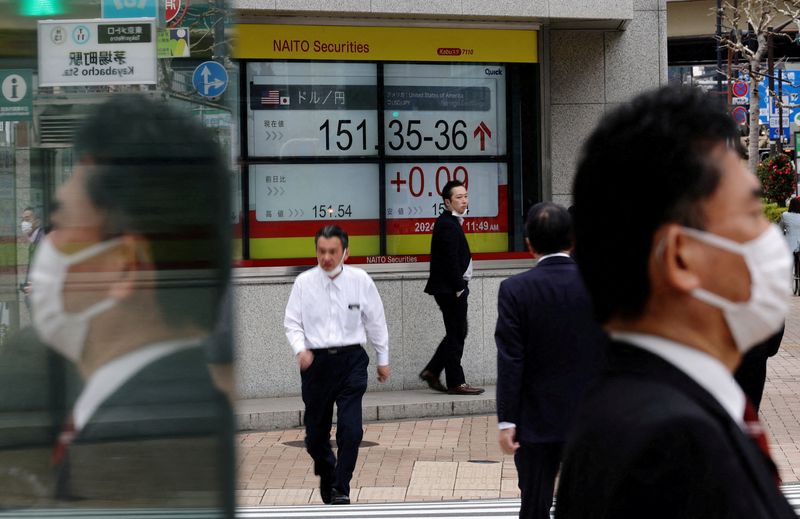
By Kevin Buckland
TOKYO (Reuters) - Asian stocks drifted lower while the dollar held firm on Tuesday as investors awaited minutes of the Federal Reserve's latest policy meeting to gauge the timing and extent of possible interest rate cuts this year.
Japan's tech-heavy Nikkei edged higher though, driven by chip shares after the Nasdaq hit a record high overnight ahead of Nvidia (NASDAQ:NVDA) earnings due on Wednesday.
Gold inched back towards Monday's all-time peak, while crude oil prices eased on worries of U.S. interest rates staying high for longer as Fed officials maintained a cautious view on a recent easing of inflation.
Cryptocurrencies ether and bitcoin climbed to new six-week highs amid speculation that the U.S. Securities and Exchange Commission (SEC) may approve a spot ether exchange-traded fund (ETF).
Markets currently factor in about 41 basis points of Fed rate reductions this year, with a quarter-point cut fully priced in for November.
Traders rushed to rebuild easing bets after data earlier this month showed consumer price pressures mitigated in April, following a string of three months of upside surprises at the start of the year.
Even so, Fed officials are reluctant to declare inflation is coming under control, with Vice Chair Philip Jefferson saying on Monday that it was too early to tell if the slowdown is "long lasting," and Vice Chair Michael Barr saying restrictive policy needs more time.
MSCI's broadest index of Asia-Pacific shares outside Japan slipped 0.6%, weighed down by the Hang Seng's more than 1% pullback from Monday's multi-month peak.
Japan's Nikkei was a rare bright spot, rising 0.2%, adding to the previous day's 0.73% rally.
Nasdaq futures inched 0.1% lower after the cash index climbed 0.65% overnight to close at an all-time high. S&P 500 futures were flat after Monday's 0.1% gain.
"Market sentiment remains relatively robust, with implied volatility low, supported by greater confidence in U.S. rate cuts this year," Kyle Rodda, senior markets analyst at Capital.com, wrote in a note.
At the same time, record highs for metals such as gold and copper "is being pointed to as a signal economic activity is improving globally, and that may be a factor keeping inflation sticky," Rodda said.
Gold eased 0.2% to about $2,420 per ounce, after pushing to the cusp of $2,450 for the first time overnight.
The dollar firmed slightly against major peers on Tuesday, with the dollar index up 0.1% to 104.69 after a similar rise on Monday.
The 10-year Treasury yield was little changed at 4.4453%, after ticking up 1.7 basis points on Monday.
Brent crude futures declined 12 cents, or 0.1%, to $83.34 a barrel, while U.S. West Texas Intermediate crude (WTI) eased 8 cents, or 0.1%, to $79.72 a barrel.
Meanwhile, the standout performers of Monday continued their rise, as traders snapped up cryptocurrencies following a report that the SEC had abruptly asked exchanges that want to trade ether ETFs to update regulatory filings, boosting bets that approval could come this week.
Bitcoin climbed as high as $71,957 and ether jumped to $3,720.80, both hitting levels not seen since April 9.
"Speculation around the ether ETF has certainly played its part in the move, throwing fuel on the crypto bull market bonfire that had reignited after last week's cooler U.S. CPI data," said IG analyst Tony Sycamore.
Sycamore expects bitcoin to retest the all-time high at $73,803.25 in coming days before making a push for $80,000.
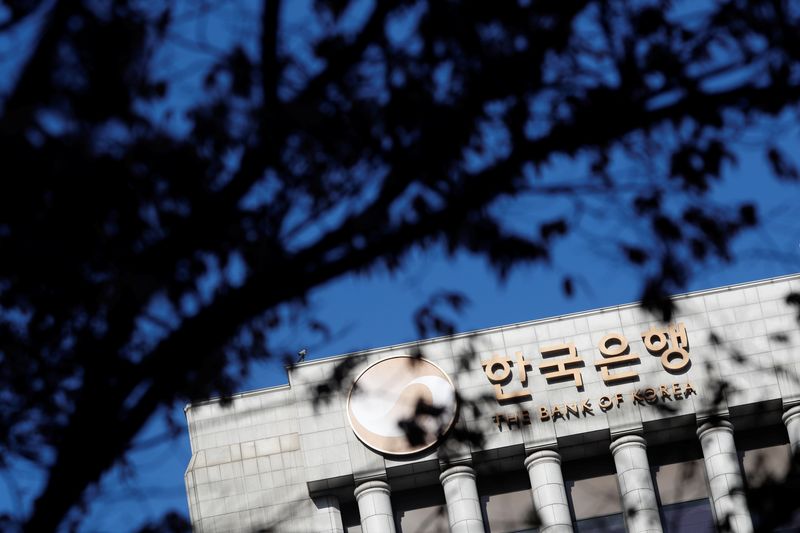
By Anant Chandak
BENGALURU (Reuters) - The Bank of Korea will keep its key policy rate unchanged for an 11th straight meeting on Thursday and through next quarter, followed by a half point cut in Q4 after the likely start of policy easing from many global peers, a Reuters poll found.
South Korea's economy grew at the fastest pace in over two years last quarter thanks to strong exports, suggesting the economy may not need an immediate rate cut from the central bank.
Bolstering the higher-for-longer rate view was elevated inflation and a weak currency.
Already down nearly 5% for the year, any further weakening of the won, would likely drive up import costs and exacerbate inflationary pressures.
All 43 economists in the May 14-20 Reuters poll expected the central bank to leave the base rate on hold at 3.50% on May 23.
Median forecasts showed interest rates remaining unchanged through the third quarter before a 50 basis-point cut by end-2024. In an April survey, the consensus view predicted 25 basis-point cuts in Q3 and Q4.
"Considering the uncertainty of the timing of the Federal Reserve's interest rate cut and the higher dollar exchange rate level, the monetary policy committee will also maintain its cautious stance in lowering interest rates," said Jihee Min, fixed income analyst at Mirae Asset Securities.
The BOK, among the first to kick-off its policy tightening cycle in August 2021, was expected to lag its global peers on the timing of the first cut.
The European Central Bank and the Fed were expected to ease in June and September, respectively.
Although median forecasts showed interest rates on hold until end-Q3, a strong minority of 17 of 39 economists forecast a cut to 3.25% by the end of next quarter.
Among those who provided forecasts until end-2024, a slim majority, or 19 of 37, expected interest rates at 3.00%, while the rest said 3.25%.
"The BOK is likely to signal that a rate cut is unlikely in the next three months but still possible by the end of 2024," noted Bum Ki Son, analyst at Barclays.
"Growth momentum remains two-tiered with strong net exports, versus a still-soft domestic outlook. The soft domestic demand growth outlook and relatively muted perceived growth still suggest that the next move will be a cut."
Last month the BOK said the economy could grow at a faster pace this year than its earlier projection of 2.1%. A separate Reuters poll in April showed the economy expanding 2.2% in 2024.
(For other stories from the Reuters global economic poll:)
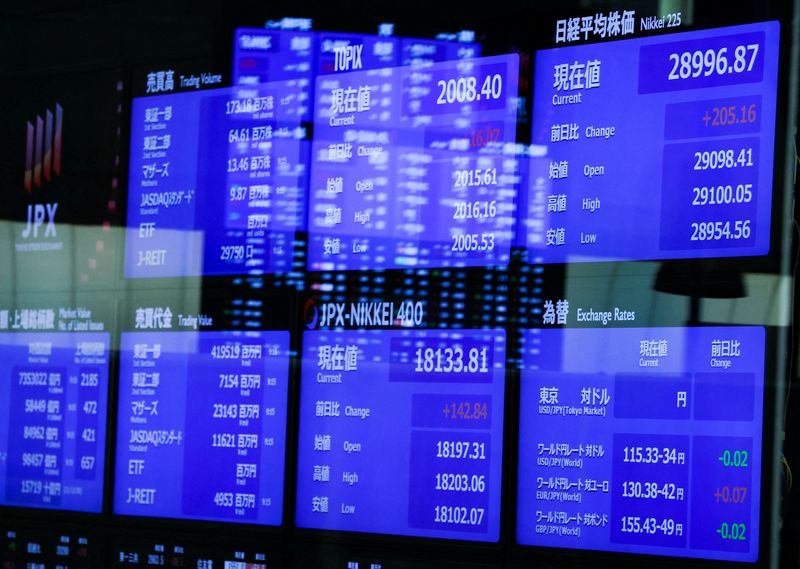
By Jamie McGeever
(Reuters) - A look at the day ahead in Asian markets.
Investors' appetite for stocks and risk assets shows no sign of waning which, in the absence of any major market-moving economic data or events in Asia on Tuesday, should pave the way for further gains across the continent when trading gets underway.
Monday's global market moves encapsulated the 'FOMO' that seems to be fueling the ongoing risk rally - volatility, the dollar, bond yields and geopolitical uncertainty all rose to varying degrees, yet equities marched higher regardless.
'Fear of missing out' - which some might say isn't all that far removed 'irrational exuberance' - is a powerful force. But it can also be a red flag, especially when long-time market bears join the frenzy.
Morgan Stanley's U.S. equity strategist Mike Wilson has not been the only Wall Street bear over the last couple of years, but he has certainly been one of the most prominent.
On Monday, he and his team raised their base-case, 12-month forecast for the S&P 500 to 5400 points. That's only up around 2% from Friday's close, but 20% higher than their previous forecast of 4500.
Only time will tell if Wilson's about-turn will be an indication that investors' exuberance has become irrational. Right now, however, at least until chipmaker Nvidia (NASDAQ:NVDA)'s earnings on Wednesday, market bulls are firmly in control.
And Asia is enjoying the ride too.
The MSCI Asia ex-Japan equity index on Monday rose to a two-year high with its seventh consecutive rise, its best run since January last year. Another increase on Tuesday will seal its best run since August-September 2021.
Japan's Nikkei is back above 39,000 points for the first time in over a month, and the dollar is back above 156.00 yen. The dollar is now within one yen, more or less, of where Japanese authorities are widely thought to have conducted yen-buying intervention on May 1.
Intervention seems unlikely right now, but currency traders will not be complacent. The latest Commodity Futures Trading Commission data show that speculators reduced their net short yen positions for a third week, but not by much.
The main event on the Asian and Pacific calendar on Tuesday is the release of the minutes from the Reserve Bank of Australia's May 7 policy meeting.
The RBA quashed market talk at the time of a near-term interest rate hike but also didn't hold out much chance of a cut for months to come. The Aussie dollar has regained its poise since then to climb to a four-month high just above $0.67.
Australian rates markets are not fully pricing in a 25-basis point rate cut until April next year.
Here are key developments that could provide more direction to markets on Tuesday:
- Reserve Bank of Australia meeting minutes
- Australia consumer sentiment (May)
- Indonesia's government presents 2025 economic forecasts to parliament
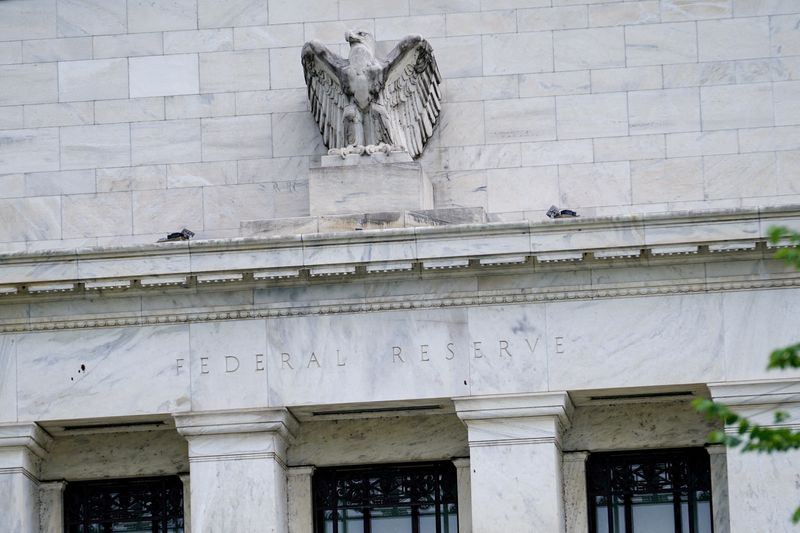
(Reuters) -The Federal Reserve and two other U.S. regulators are moving toward a new plan that would significantly reduce a nearly 20% mandated increase in capital for the country's biggest banks following lobbying efforts by industry CEOs like JPMorgan Chase (NYSE:JPM)'s Jamie Dimon, the Wall Street Journal reported on Sunday.
Required increases in capital for banks like JPMorgan and Goldman Sachs meant to ensure they have sufficient buffers to absorb potential losses — would on average be about half as much as originally floated, the Journal added.
Top officials from all three agencies involved in the pending capital rules — the Federal Reserve, the Federal Deposit Insurance Corporation and the Office of the Comptroller of the Currency — are still discussing substantive and technical revisions and there is no guarantee that an agreement will be reached, the WSJ reported.
The Fed, FDIC and OCC declined to comment on the report.
The three bank regulators, led by the Fed, in July last year unveiled a proposal to overhaul how banks with more than $100 billion in assets calculate the cash they must set aside to absorb potential losses.
The Basel proposal aims to make banks more resilient to potential losses, lowering the risk of failures or bailouts. Banks say that they are already highly capitalized and the changes are unnecessary.
Big U.S. banks have lobbied against the Basel proposal, which they say will force them to overhaul or shut down a range of products and businesses.
Goldman Sachs recruited dozens of small business owners to travel to Washington and urge lawmakers to reconsider the proposal, a Reuters review of private Goldman documents, interviews with program participants and public disclosures show.

Investing.com-- China’s housing market sales will likely take at least six to 12 months before stabilizing, Morgan Stanley analysts wrote in a recent note, with a bulk of this stability tied to just how the government rolls out funding support.
MS analysts noted that China’s housing market reacted positively to recent measures from the government to support the sector, while also noting that China’s latest move- which heralded potential government buying of inventories- exceeded expectations.
The People’s Bank of China will also set up a 300 billion yuan housing relending facility.
But the execution funding and timing of the new measures will be crucial in how well the market recovers, particularly the inventory buying and funding plans. MS analysts said that at least 80% of the funding requirements for the government’s inventory digestion plans were not yet fulfilled.
Beijing also needed to specify how the inventory management will be priced, and what developers will be prioritized- between state-owned and private enterprises.
MS analysts said a “base-case” scenario entailed at least another six to 12 months before housing sales stabilized.
“Faster execution of the support measures, early clarification of the questions above, and an incremental step-up in efforts when needed, could imply potential upside to earlier earnings growth reacceleration, as well as a better outlook for China coming out of deflationary pressure,” MS analysts wrote in a note.
China’s property market- which accounts for at least a quarter of the world’s second-largest economy- has been a key point of pressure on growth, as it saw a prolonged downturn over nearly four years.
The downturn was also marked by several high-profile defaults, such as China Evergrande Group (HK:3333) and Country Garden Holdings Company Ltd (HK:2007), which were among China’s biggest developers.
While Beijing had rolled out a string of monetary stimulus measures over the past two years to support the sector, they had offered little relief. The government was seen only recently implementing its most targeted measures yet for the property market.

